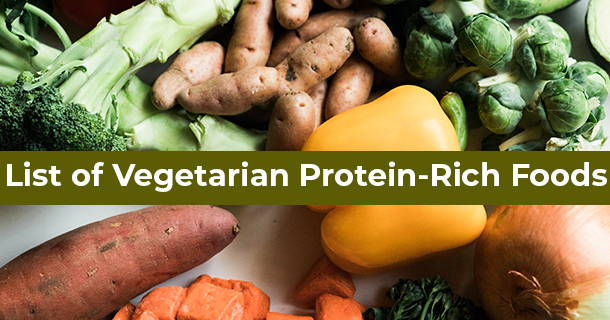Protein is an important part of our daily diet. They provide the growth factors that our muscles, cells, and other vital tissues require in order to remain healthy and function properly.
In India, a large majority of the population chooses to consume a vegetarian diet. While this is a healthy diet, it may be lacking in critical nutrients like vitamin B12 and proteins.
Despite clinical evidence suggesting that people who eat a vegetarian diet have a lower risk of heart disease and its complications, it is common to discover vegetarians with low vitamin B12 levels in clinical research.
We’ll take a look at a few vegetarian protein-rich foods in this post.
Protein Consumption
Proteins are made up of amino acids, which are the basic building blocks. Amino acids are necessary for cell growth and development throughout our lifetimes. Proteins are essential to our skin, hair, and a number of other physical parts, as well as our critical organs.
If we eat less protein, we risk losing muscle strength and mass, as well as being weaker. When someone is recovering from a medical condition, consuming a high protein diet can help them recuperate more quickly. Take a look at a few of the vegetarian protein-rich foods on the market.
Lentils
For vegans, lentils are a good source of protein. In Indian cuisine, lentils, also known as daal, are a common element. Lentils have about 18 g of protein per cup, making them an excellent vegetarian protein source. Lentils taste great in soups and with rotis or rice.
In terms of nutrition, lentils have a considerable quantity of fiber, which can help maintain healthy gut flora. It’s been suggested that eating lentils on a regular basis may reduce your chances of heart disease and cancer. A tiny number of people who consume lentils on a regular basis, however, may have excessive flatulence.
Legumes
Black beans, Kidney beans, chickpeas, and other legumes are abundant in protein and are often referred to as “protein powerhouses.” Chickpeas provide about 15 grams of protein per serving, as well as a range of many other nutrients and minerals that keep you healthy, strong, and fit. Regularly eating legumes has also been found in clinical research to help decrease cholesterol levels. Chickpeas and other legumes are wonderful in low-fat, low-salt salads and curries.
Nuts
Nuts are superfoods in a sense. If you wish to consume a high-protein vegetarian diet, you might include nuts in your meal. Almonds and cashew nuts, for example, are abundant in protein and should be included in the protein foods veg list at all times.
Taking 20 to 25 whole almonds per day can provide you with approximately 6 g of protein. Although this can be a lot to consume all at once, a few mixed nuts a day can suffice. Additionally, nuts are rich in dietary fiber and vitamin E.
Peas (green)
At first look, green peas may not look to be a high-protein food, yet they are.
The protein content of a cup of these leafy greens is around 9 grams. Vitamins A, K, and C, as well as a range of minerals and fiber, are abundant in them.
Adding green peas to your vegetarian diet can help you obtain the extra protein your body requires.
Chia Seeds
Chia seeds are becoming more popular as a superfood in India. A 35-gram serving of chia seeds has 6 grams of protein and 13 grams of fiber! They’re also high in calcium, magnesium, and iron, as well as omega-3 fatty acids and antioxidants, all of which make sure you stay in prime condition.
Chia seeds are easy to use, but make sure you obtain organic varieties. Also, be sure you’re not eating basil seeds, which appear similar to Chia seeds.
Fruits
Fruits have a lower protein content than other foods. Fruits such as guava, bananas, and some berries, on the other hand, have a high protein content. Rather than relying on fruits as a protein source, explore one of the options mentioned earlier in this article.
The list of vegetarian protein-rich foods shown above is extensive. Make sure to combine and incorporate each of these into your everyday diet as much as possible.
Vegetables that are high in protein
Vegetables are often assumed to contain only vitamins and minerals, along with a small quantity of carbohydrates and proteins. Other vegetables, however, have a higher protein level, such as spinach, potatoes, broccoli, green beans, and even sweet potatoes. Even if the amount of protein in any of these isn’t similar to non-vegetarian sources, it’s still a decent deal at around 5 g per cup of cooked vegetables.
Soy Milk
Lately, there has been a lot of marketing advertising soy milk as a high-protein option, which is correct. Many lactose-intolerant people require a protein alternative, and soy milk is an excellent option, with roughly 7 grams of protein per cup. Soy milk is high in calcium, vitamin B12, and vitamin D, but it’s not just the protein that makes it so nutritious.
There is a range of soy-based product lines that are rich in proteins in addition to milk. Examples include tofu, edamame, and tempeh. Because they maintain a high protein level while also offering other nutrients, these products have similar health benefits to soy milk.
They can also help you eat less by alleviating hunger pangs because, unlike soy milk, they are solid foods. As a result, these products can help you achieve your daily protein needs while also supporting you in your weight loss goals.
Note: Because everyone’s demands are different, the reader should see their doctor determine whether the foods are suitable for them.

 February 11th, 2022
February 11th, 2022
 Posted in
Posted in  Tags:
Tags: